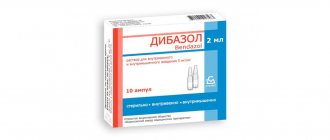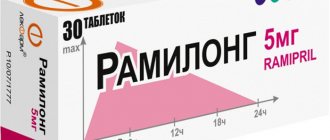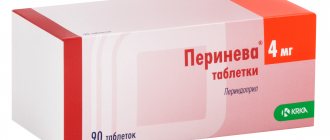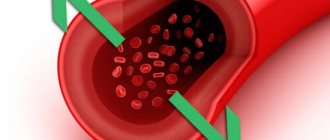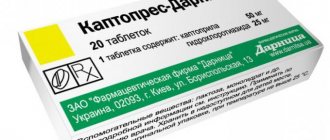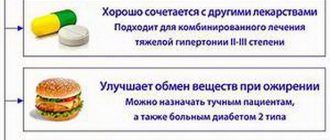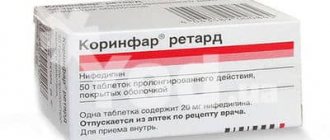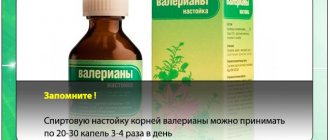At what pressure is the drug used?
Andipal can only be taken with high blood pressure. The drug does not treat hypotension and does not eliminate the causes of the pathology. The main effect of consuming the drug is a decrease in the intensity of symptoms accompanying high blood pressure. For this reason, Andipal is considered as an emergency drug.
The maximum level at which taking the medication is justified is 160 mmHg. At higher levels, it is not recommended to consume Andipal. This is due to the effect of bendazole in the tablets. The substance first increases blood pressure and then lowers it.
Note!
The description of the drug Andipal on this page is a simplified author’s version of the apteka911 website, created on the basis of the instructions for use.
Before purchasing or using the drug, you should consult your doctor and read the manufacturer's original instructions (attached to each package of the drug). Information about the drug is provided for informational purposes only and should not be used as a guide to self-medication. Only a doctor can decide to prescribe the drug, as well as determine the dose and methods of its use.
Pharmadynamics and pharmacokinetics
Andipal begins to act 15 minutes after administration. This is due to the fact that the active components of the drug are quickly absorbed into the blood. The condition of a person with high blood pressure is normalized by improving cerebral circulation and stopping the release of adrenaline.
Analgin, entering the body, helps reduce the pain symptoms of migraines. The substance also reduces the severity of swelling in soft tissues, which provokes an increase in body temperature.
Papaverine eliminates spasms of smooth muscles in the digestive organs and in the walls of blood vessels. By dilating the arteries, blood flow improves.
Dibazol reduces heart rate and normalizes breathing. Phenobarbital in the drug has a sedative effect on the cells of the central nervous system.
Andipal forte: instructions, reviews, analogues, price in pharmacies
active ingredients: 1 tablet contains metamizole sodium 500 mg (0.5 g), bendazole hydrochloride 40 mg (0.04 g), papaverine hydrochloride 40 mg (0.04 g)
excipients: potato starch, calcium stearate, talc.
Dosage form
Pills.
Basic physical and chemical properties: tablets are white or white with a slight yellowish tint, with a flat surface, beveled edges and notches.
Pharmacological group
Analgesics and antipyretics. Metamizole sodium, combinations without psycholeptics. ATX code N02B B52.
Pharmacological properties
- Pharmacodynamics.
- A combined drug with analgesic, antispasmodic and vasodilating effects due to the specific action of its components. The drug also has a hypotensive and antipyretic effect
- Metamizole sodium is an NSAID (NSAID) of the group of pyrazolone derivatives, has anti-inflammatory, analgesic and antipyretic effects, the mechanism of action of which is due to inhibition of cyclooxygenase (COX) and blocking the synthesis of prostaglandins from arachidonic acid, as well as disruption of the conduction of painful extra- and proprioceptive impulses, increasing the threshold of excitability thalamic centers of pain sensitivity, increased heat transfer.
- Bendazole hydrochloride - has vasodilating, antispasmodic, hypotensive effects, and also has a stimulating effect on the functions of the spinal cord and helps restore the functions of peripheral nerves, and has a moderate immunostimulating effect.
Papaverine hydrochloride has a myotropic antispasmodic, hypotensive effect. Blocks phosphodiesterase, causes the accumulation of cyclic adenosine monophosphate (cAMP) and a decrease in calcium content in the cell, relaxes the smooth muscles of blood vessels and internal organs.
Pharmacokinetics.
When taken orally, it is quickly and completely absorbed. In the intestinal walls it is hydrolyzed to form an active metabolite. The action develops after 20-40 minutes and reaches a maximum after 2:00. Metabolized in the liver. Excreted by the kidneys.
Clinical characteristics
Indications
Pain syndrome associated with spasm of blood vessels or smooth muscles of internal organs.
Contraindications
Known or suspected hypersensitivity to metamizole sodium salt, pyrazolone derivatives (butadione, tribuzone, antipyrine) suspected of acute surgical pathology; anemia of any etiology, cytostatic or infectious neutropenia; leukopenia agranulocytosis thrombocytopenia hepatoporphyria; deficiency of glucose-b-phosphate dehydrogenase; bronchial asthma; respiratory depression, broncho-obstructive syndrome, diseases occurring with decreased muscle tone, convulsive syndrome; glaucoma.
Composition and release form
Andipal is available in the form of round tablets of white or yellowish color. There are distinctive marks on the surface of the tablets. At the pharmacy, the drug is sold in cardboard or paper packages containing 10 tablets of the drug.
1 pill contains the following active ingredients:
- analgin – 0.25g;
- dibazol – 0.02 g;
- papaverine – 0.02 g;
- Phenobarbital – 0.02 g.
Among the auxiliary components of the medication are:
- potato starch – 47.7 mg;
- talc – 9.25 mg;
- stearic acid – 2.9 mg.
Indications for use
The tablets are sold in pharmacies without a doctor's prescription. Indications for taking the medicine:
- hyperthermia accompanied by an inflammatory process;
- increased blood pressure;
- vegetative-vascular dystonia;
- spasms of smooth muscles of the gastrointestinal tract;
- circulatory disorders in the brain.
The medicine is prescribed to reduce pain in the postoperative period, during complex diagnostic procedures and with high blood pressure.
Andipal
Andipal is a combination drug with analgesic, antispasmodic and vasodilating effects.
Contains the substances papaverine hydrochloride, metamizole sodium, bendazole. Papaverine is an opium alkaloid, an isoquinoline derivative. The drug has antispasmodic, hypotensive and myotropic effects. Isolated from opium and studied in 1848 by Georg Merck, son of Emmanuel Merck, founder of the largest German chemical and pharmaceutical company Merck Corp.
Analgin (metamizole sodium) is a drug that has an analgesic, antipyretic and mild anti-inflammatory effect. Belongs to the pyrazolones group in the ampirone sulfonate family of drugs. In many countries, it has been withdrawn from the pharmaceutical market due to the risk of developing agranulocytosis.
Bendazole is an obsolete drug with vasodilating and immunostimulating effects. There is no evidence of the effectiveness and safety of the drug.
There is still a drug on the market, Andipal Avexima, with the addition of a fourth active ingredient - phenobarbital. It has a depressing effect on the cerebral cortex, thereby reducing activity and inhibiting cerebral functions, including the respiratory center. Reduces the tone of smooth muscles of the gastrointestinal tract (GIT). In small doses, phenobarbital has a sedative effect.
Contraindications
In addition to hypotension, Andipal has other contraindications for use:
- blood pathologies – coagulation disorders, anemia;
- all types of glaucoma;
- arrhythmia;
- sensitivity to the components of the drug;
- kidney and liver diseases;
- hereditary disorder of pigment metabolism;
- obstruction of the gastrointestinal tract.
The medicine must not be taken during pregnancy, regardless of trimester. Clinical trials have revealed the harmful effects of the drug's components on the developing fetus. Taking Andipal during gestation threatens to cause deviations in the psychological state of the child - developmental delays, impaired speech functions.
The drug helps with headaches, so patients believe that it can be used to combat hangover. The instructions say that the drug should not be used with alcoholic beverages, since the active substances of Andipal greatly enhance the effect of alcohol on the human body. This can lead to unpredictable consequences.
Interaction with other drugs and analogues
Since Andipal Avexima has a slight depressant effect on the nervous system, ethanol-based products should not be used during treatment with the drug. Drinking alcohol during therapy is also prohibited. If you take medications with a sedative effect and anesthetic properties at the same time as Andipal, the effect of all medications will be enhanced at once.
Analogues of the drug:
- Papazol;
- Theodibaverine;
- Urolesan;
- No-shpa;
- Drotaverine;
- Unispaz.
This drug can replace Andipal in its antispasmodic and anti-inflammatory effects. However, you should not replace the medications recommended by your doctor with others on your own - each of them has side effects and contraindications
Hypertension is a disease caused by poor diet, excess weight, addictions and concomitant diseases of the heart and blood vessels. Taking antihypertensive drugs helps eliminate sudden increases in blood pressure and normalize the patient’s condition, but it is better to carry out therapy in combination. The use of tablets should be combined with a healthy lifestyle, outdoor walking, proper nutrition and stress prevention. Then the use of Andipal or other antihypertensive drugs will be minimized.
Admission rules
In order to get the maximum effect from the drug, you must adhere to some rules during treatment:
- Take the drug once when signs of hypotension appear. Take 1-2 tablets at a time.
- Use the drug for long-term therapy only with the permission of a cardiologist. The duration of therapy does not exceed 10 days
- Take the drug with food. A tablet taken before meals causes irritation of the mucous membranes of the stomach and intestines.
- For long-term use, do not take more than 4 tablets per day.
The dosage of the medication may vary depending on the therapeutic goals:
- to relieve headaches, Andipal is taken in 2 doses with an interval of 1 hour;
- for hypertension, drink the drug 2 times a day for 3 days.
In the initial stages of hypertension, Andipal is taken only in extreme cases. Failure to comply with the dosages prescribed by the doctor may lead to the appearance of a collaptoid state.
For blood pressure, the drug is indicated for children from 8 years of age. For hypertension, they are allowed to take 2-3 tablets per day.
Adverse reactions
Therapy with Andipal can cause:
- allergic skin rashes;
- feelings of drowsiness;
- liver dysfunction.
After taking Andipal, it is not recommended to drive a vehicle or perform work that requires increased concentration.
Among the side effects of the drug are:
- blood thinning;
- development of a depressive state;
- depression of the nervous system;
- decreased motor activity.
Due to numerous adverse reactions, Andipal is not recommended for use as a pain reliever. For this purpose, drugs with a milder therapeutic effect are selected.
In case of an overdose of the drug, the following is observed:
- drowsiness;
- dizziness;
- collptoid state.
Andipal
The frequency of these side effects is indicated in accordance with the WHO classification: very often - more than 10%; often - more than 1% and less than 10%; infrequently - more than 0.1% and less than 1%; rarely - more than 0.01% and less than 0.1%; very rarely - less than 0.01%, including isolated cases: frequency unknown - based on available data, it was not possible to establish the frequency of occurrence.
For Andipal:
To date, no side effects have been reported with this combination. The incidence of the following possible side effects is unknown.
From the central nervous system
: drowsiness, decreased speed of psychomotor reactions.
From the digestive system
: nausea, constipation.
From the cardiovascular system
: arterial hypotension.
Allergic reactions
:
With long-term use
: leukopenia, agranulocytosis, impaired liver and kidney function.
For Metamizole sodium:
From the skin
: uncommon - persistent drug rash; rarely - rash (for example, maculopapular); very rarely - Stevens-Johnson syndrome, toxic epidermal necrolysis.
From the urinary system
: very rarely - acute renal dysfunction, which in very rare cases can lead to proteinuria, oligo- or anuria and acute renal failure, acute interstitial nephritis.
From the hematopoietic organs
: rarely - leukopenia; very rarely - agranulocytosis, including fatal cases, thrombocytopenia; frequency unknown - aplastic anemia, pancytopenia, including fatal cases.*
*These reactions can occur even if metamizole sodium has not previously caused complications. There are a number of signs of an increased risk of agranulocytosis if metamizole sodium is used for more than one week. This reaction is dose-independent and can occur at any time during treatment. It is manifested by high fever, chills, sore throat, pain when swallowing, inflammation of the mucous membranes of the mouth, nose, throat, genital and anal area. However, when antibiotics are used, these phenomena may be mild. There is a slight enlargement of the lymph nodes and spleen or no enlargement at all. The erythrocyte sedimentation rate increases significantly, the content of granulocytes is sharply reduced or they are not detected. As a rule, but not always, normal levels of hemoglobin, red blood cells and platelets are maintained. Treatment tactics involve immediate discontinuation of the drug, i.e. the drug should be discontinued immediately, without waiting for laboratory results, if there is an unexpected deterioration in the general condition, the fever does not subside, or new or painful ulcerations appear on the mucous membranes, especially in the mouth, nose or throat. If pancytopenia occurs, the drug should be discontinued immediately and a complete blood count should be monitored until its values return to normal.
From the cardiovascular system
: uncommon - isolated decrease in blood pressure (possibly pharmacologically caused and not accompanied by other manifestations of anaphylactic/anaphylactoid reactions). The decrease in blood pressure can be pronounced. During fever, a dose-dependent sharp decrease in blood pressure without other signs of a hypersensitivity reaction is also possible.
Allergic reactions
: rarely - anaphylactoid or anaphylactic reactions; ** very rarely - analgesic bronchial asthma. In patients with analgesic bronchial asthma, intolerance usually manifests itself as attacks of bronchial asthma; frequency unknown - anaphylactic shock. **
**These reactions are especially common with parenteral administration of metamizole sodium and can be severe and life-threatening, in some cases leading to death. These reactions can occur even if metamizole sodium has not previously caused complications. These reactions may occur during administration or immediately after ingestion, or develop several hours later. However, they predominantly occur within the first hour after application. In milder cases, they manifest as rashes on the skin and mucous membranes (eg, itching, burning, redness, blistering and swelling), shortness of breath and, less commonly, gastrointestinal disorders. In severe cases, these mild reactions can develop into generalized urticaria, severe angioedema (including of the larynx), severe bronchospasm, cardiac arrhythmia, arterial hypotension (in some cases preceded by an increase in blood pressure), shock. In this regard, at the first signs of skin reactions, the drug should be discontinued.
Others
: Not known - Red urine has been reported and may be due to the presence of low concentrations of rubazonic acid (a metabolite of metamizole sodium).
For Phenobarbital:
From the central nervous system
: frequency unknown - asthenia, dizziness, general weakness, ataxia, nystagmus, paradoxical reaction (especially in elderly and weakened patients - agitation), hallucinations, depression, nightmares, syncope.
From the digestive system
: frequency unknown - vomiting, liver dysfunction with long-term use.
From the hematopoietic organs
: frequency unknown - agranulocytosis, megaloblastic anemia, thrombocytopenia.
Allergic reactions
: frequency unknown - skin rash, urticaria, swelling of the eyelids, face and lips, difficulty breathing, rarely - exfoliative dermatitis, malignant exudative erythema (Stevens-Johnson syndrome).
Others
: frequency unknown - with long-term use drug dependence.
For Bendazole:
The listed effects appear when used in large doses. When the dose is reduced or the drug is discontinued, these side effects quickly disappear.
From the central nervous system
: frequency unknown - dizziness, headache.
From the skin:
frequency unknown - increased sweating.
From the digestive system
: frequency unknown - nausea.
For Papaverine hydrochloride:
From the central nervous system
: often - drowsiness.
From the skin
: often - skin rash (usually erythematous, urticaria), infrequently - itching, rarely - increased sweating.
From the digestive system
: often - nausea, constipation, infrequently - increased activity of liver transaminases.
From the cardiovascular system:
often - decreased blood pressure, infrequently - ventricular extrasystole.
From the hematopoietic organs
: very rarely - eosinophilia.
Interaction with other medications
When Andipal is combined with other synthetic drugs, an increased hypotensive effect may be observed. Such means include:
- nitrates – Nitrosorbit, Monosan, Dinisorb;
- myotropic antispasmodics – Drotaverine, Nosh-pa, Papaverine;
- diuretics – Veroshpiron, Furosemide, Uregit;
- beta blockers - Nebivolol, Penbutolol, Anaprilin.
- Ganglioblockers – Gigroniy, Pentamin.
If Andipal is used in conjunction with other non-narcotic drugs, the toxic effect on the body may be increased. It is not recommended to take the drug with sorbents, as they reduce the level of absorption of the active components into the gastrointestinal tract. The shelf life of the drug is 2.5 years.
Patient reviews
Alexander 34 years old . “The drug is well suited for slightly elevated blood pressure, but for people whose blood pressure rises to 200 mm Hg. he won't help. The product saves me from headaches and nausea that occurs after overwork or drinking coffee. I recommend that people who are taking medicine for the first time consult a doctor. The undeniable advantage of the medicine is its cost.”
Stanislav is 54 years old . “I took Andipal in the initial stages of the development of hypertension, when the pressure rose to 140-160 mm Hg. Art. Over time, the drug stopped helping, since the tablets only slightly lower blood pressure and are addictive if used frequently. I believe that the medicine is suitable for young people who do not suffer from chronic hypertension. For people with gastrointestinal diseases, it is better to give preference to other medications, since Andipal negatively affects the mucous membranes of the intestines and stomach.”
Elena is 41 years old . “My parents have been drinking Andipal since 2010. Recently, the drug has stopped helping due to the fact that addiction to its components has occurred. During treatment, parents noted a side effect – nausea.”
Svetlana, 36 years old . “I had to take Andipal while on vacation. After drinking whiskey I had a severe headache. I drank the drug at risk to my health, since the medicine is not compatible with alcohol. Fortunately, there were no adverse reactions. I advise anyone who is planning to undergo a course of medication to consult a doctor first. This medicine has many side effects."
Tatyana, 38 years old . To take the drug as an antipyretic or analgesic, it is necessary to control the blood pressure level. The product is not suitable for people suffering from low blood pressure. These tablets help me with hypertension associated with changing weather or stress. Among the main advantages I can note the low cost. The only drawback of the product is the lack of instructions for use.
Doctor's recommendations online
When taking Andipal for blood pressure, a rapid therapeutic effect is observed. Its effectiveness is evidenced by reviews from patients suffering from hypertension. Before using the product, you must ensure that there are no contraindications. If you take the medicine for hypotension or to relieve a hangover, you can get negative consequences in the form of nausea, weakness and an allergic reaction. The medication is suitable for one-time or short-term use. For course treatment, Andipal is taken only with the consent of the doctor, since it affects the composition of the blood and is addictive.


